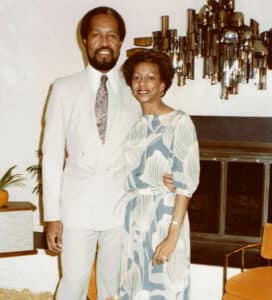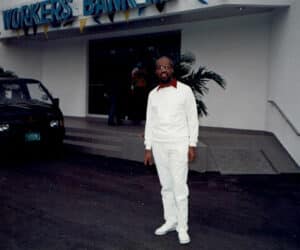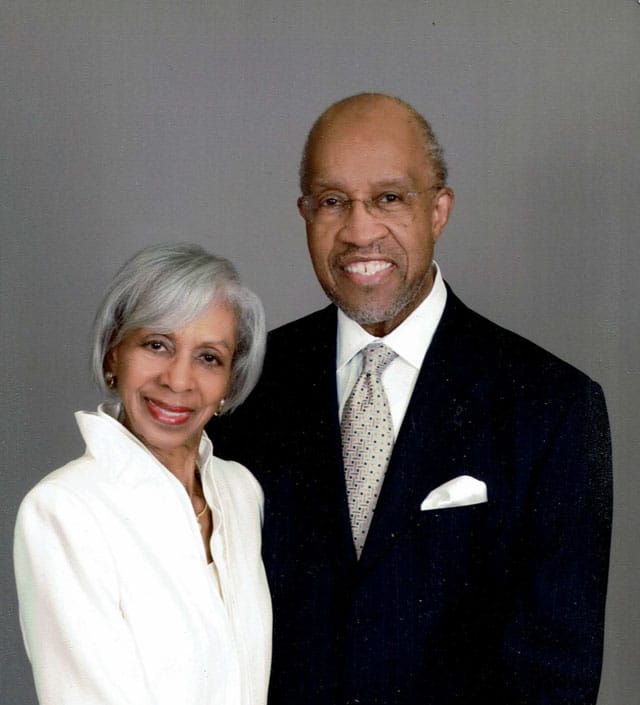Editor’s note: Rethinking65 met LeCount R. Davis Sr, CFP, at the recent 2023 CFP Board Diversity Summit in Arlington, Va. Davis, who holds bachelor’s and master’s degrees in accounting, was the first Black person to earn the CFP designation, in 1978. Twenty years ago, he founded the Association of African American Financial Advisors (AAAA). Davis, 86, still runs the firm he established in 1970 that specializes in tax planning, small business management, financial planning, financial management and investment consulting. In 2022, the CFP Board Center for Financial Planning established its first endowed scholarship to honor Davis and grow the next generation of diverse CFP professionals.
Jerilyn Klein: At the CFP Board Diversity Summit, people spoke about the importance of diversity, equity and inclusion for Blacks, Latinos, Asians and women. But little was mentioned about another group that often faces discrimination in the workplace: older employees. Do you think age diversity should also be part of DEI efforts in the financial-services industry?
Davis: Yes, I do, because we need to learn from the past about how to handle the present and prepare for the future. DEI is going to be instrumental in preparing our seniors — and I am one of them. When I started in business, I learned at the feet of the people who traveled the road before me. I wanted to learn how the populations [advisors and clients] handled situations so I could deal with the problems and bumps in the road that I knew I was going to have to face. When it comes to finance and economics, the industries have a tendency to repeat themselves.
And by bringing up the positive, not the negative, that’s how I approach DEI.
Klein: Advisors and other professionals who own their own practices can stay in business as long as they remain capable and have clients and resources. But it’s a bit different at some larger institutions. While they might not say, “You’ve reached a certain age, you’re out of here,” we know that older employees don’t always get treated well and are often hit hard during downsizing. What do financial-services firms need to do to better value older workers?
Davis: Those in the C-suite, who are making the decisions and running the company, and the [client-facing] representatives of the company may have different ideas on how to approach people — and sometimes they never meet. But being in the C-suite doesn’t mean that they know everything, because they don’t. They have to go to older financial advisors and other foot soldiers out there who know exactly what is being said and what’s being done.
Take women, for instance, who have made tremendous progress in the last decade and are doing very well as advisors. The C-suite people made the right choice of backing organizations or avenues to get the work from the women. Those [older female advisors] who have been on that journey before are going to continue doing it very well.
And what about black women? You don’t say that that person is a senior advisor and just dismiss them without realizing that they have gone through their journey of asset accumulation and helping people. You could benefit if you hired them or if you contracted with them. If you make the decision that you want to reach that [client] market, it is cost beneficial to partner with a group that has been there before.
C-suites have made the decision already to pursue a portion of the spending power of Blacks. If that’s the case and I’m a senior [advisor], I’m looking at it in a different way: I’m not in the C-suite, but I know the culture of the people, I know the problems they’ve gone through, I know the trends they’ve survived, and I know they really don’t trust. The bigger the company, the more distrust there is among the people they’re trying to reach.
I don’t want to give the impression that there’s a boogeyman behind every tree, but people need to find a financial advisor they are comfortable with, Number 1. If you’re not comfortable with that person and satisfied that they are competent, trustworthy and always put you first when it comes to financial decisions, you shouldn’t have that person as a financial advisor. The brokerage houses — the big boys, as we call them — have thousands of people to deal with almost everything that can happen in the financial world, but that will not buy the trust.
You can’t buy trust; you have to earn trust. So, we need advisors to develop that type of relationship between them and the senior population to help them protect the assets they have accumulated.
Klein: This is a good time to segue to another topic I’d like to discuss: How advisors can assist older Americans who lacked opportunities to build wealth and save for retirement. At the CFP Board Diversity Summit, panelists spoke about how income gaps, knowledge gaps and predatory lending practices, to name a few, reduced these opportunities for Black Americans. Is it possible for advisors to help them catch up later in life? And are there things the U.S. should be doing to help?
Davis: If you start your retirement years and you don’t have any wealth accumulated, there’s nothing to protect. But you still have to meet the everyday expenses and life expenses, and have nothing to accumulate for emergencies or contingencies that may pop up. So, we’re starting out with a problem and a handicap with that population.
Yes, there are things we must do if we want to protect the seniors the way I think we should be protecting them, and the government should be part of that. But I don’t want to make my opinion strictly on a political basis. See, wealth building and financial planning is a people business. You have to relate to them and understand exactly where they’ve come from and where they are, meet them where they are, and show them what to do from here on in.
The CFP Board has a pro bono section for people who cannot afford the expenses of preparing for retirement or preparing for contingencies. The Foundation for Financial Planning, the Association of African American Financial Advisors and other groups also offer pro bono services to those who cannot afford it. But this should be done before retirement — during the accumulation phase while they’re still working and they’re still putting money aside. Introducing them to goals-based planning is important, so they can put aside money based on the goals they select.
Klein: Are there trends you’ve seen among older people who didn’t have the opportunity to build wealth and save and plan for retirement? And how have you helped them?
Davis: You’re dealing with the mind, what we call behavioral finance. They have been embedded with the wrong way to do things, not because they wanted to do it that way but because they didn’t know the right way. One of the big problems is they thought you had to be a millionaire to discuss this topic. When we give seminars and talk about wealth building, they’ve said, “Mine is not a case of wealth building. I just can’t survive with what I’ve got.” So, we have to come up with a different way of communicating with them.

I try to focus on what they should and should not do, and they should not be basing everything on dollars and cents. They have to have options; they have to have reasons for doing this. Several people in my church, where I set up a financial family literacy ministry, didn’t know anything about financial planning — they felt that it was only for rich people. I’m trying to let them know that to be a good steward of your money, there are the things you need to do whether you make $10,000 a year or $100,000 a year. You need to know how to deal with what you have access to, and that is the option that allows you to move forward.
The industry has been talking about the [racial] wealth gap and it’s going to be difficult to ever close the gap because the ones on top of the gap are going to move up every time we move up. But I do tell them, “You do have options and your option is to improve your financial situation.” I tell them that I want to see them in a better financial position next year than this year and watching the trend. Some clients are spending more than they’re making, no matter how much they’re making; they have to get out of that atmosphere and start looking at their net worth, not just their income statement.
Klein: What about your wealthier older clients? What are they concerned with and can you share a couple of examples of how you’re helping them?
Davis: I have some seniors who are in that upper age category, octogenarians and older. They’ve accumulated assets and are required to take required minimum distributions from their retirement plans. The question often comes up that they don’t need the money — they have more than enough household income coming in from annuities and from what they have set up during the accumulation period. So, they need advice on what to do with the excess. It’s one thing to say, “Go to the fixed-income part of investment planning,” but that’s not good enough.
Seniors are also vulnerable because they’re too trustworthy to avoid some of the scams and financial abuse that they had to suffer unknowingly, so they need help during that particular period of time. Another problem is many seniors do most of their retirement planning after they retire, and that’s not retirement planning, that’s retirement implementation.
“Another problem is many seniors do most of their retirement planning after they retire, and that’s not retirement planning, that’s retirement implementation.”
I’m a supporter of the goals-based investment theory of planning, which I mentioned earlier. For example, if you’re going to help your family and go into the charitable-giving phase of your life and pass your blessings on to the next generation, that should be put into your plan.
I’ve recently worked with two widows whose spouses died and left them good sums of money. They never knew about planning or investing because when their husbands were living, they took care of everything. One husband suggested that if and when he passed his spouse should contact me. In one case, the [client] relationship has lasted over 40 years. Another client is financially set for life and has done all the things on his bucket list. Those are the good stories.
In other cases that haven’t been blessed with household-income flow, families are stuck with the fact that with what [little] they have to pass on, the next generation will be worse off than they are. They’re behind the eight ball instead of in front of it.
Klein: At the Diversity Summit, you told me about a 92-year-old client who is investing like a 25-year-old because she is investing for her grandchildren. I’d like to hear more about this client, whose investment strategy is far from her chronological age. When is this fine and when might it be problematic?
Davis: She’s a former judge. When the market went down, I asked her if she was worried and she said, “No, I’m not worried about it. I don’t even check those things. I just read your reports and do what you tell me to do.” I send out a quarterly economic overview. I was more concerned about her goals and objectives being met than I was about how many points the S&P 500 went up during a particular period. The goals-based investment theory means you’re not concerned about anything other than the goals you set up [not even age].
I also use another phrase, the “big three.” No matter who’s the president of the United States, no matter what the Fed may do with interest rates, no matter anything that happens in the marketplace, focus your investment habits on the big three: goals and objectives is one, two is the time horizon and three is the risk tolerance level. As long as their portfolio dwells in that atmosphere, [and you’re] concentrating and monitoring their situation based on those three things, they will always be OK. It doesn’t mean there won’t be some problems, and you’ll have to rebalance the portfolio.
Another client who is 88 is putting $100 a month into a separately managed account to invest for her grandchildren. She could put it directly into the 529 [college savings] program, but her grandchildren may need the money for things that are not eligible education expenses and she believes her children have taken care of education planning [for her grandchildren].
Klein: What are the risks if an advisor just stereotypes older clients based on age rather than looking at them individually?
Davis: All of us are not the same. And therefore, you’ve got to deal with individual goals and not just the industry itself being content with an up market. If that market is not benefitting the client’s goals, then it’s for naught.
A client recently came in and said, “I will be retiring in three years, but I’m not going to stop working.” We’ll sit him down and ask him what he wants to do when he retires. You’ve got to reach out to something. For example, some people want what we call a luxury retirement — maybe Mediterranean cruises or something that costs a lot of money. Others might just want to increase their assets to the point where they can transfer them to their children. Someone else might want to go into the charitable giving stage but not know how to do it.
Klein: You’ve had a long and great career from what I’ve read. What are you most proud of and what did you find most challenging in building your career?
Davis: One of the better things that’s happening to me right now is the endowed scholarship fund that has been set up in my name. We are doing things now that we’ve never done before. Throughout my 50 years as an independent advisor, I stayed away from the crowd who told me what I couldn’t do. I achieved many of my awards and accolades after age 65 when given the opportunity to succeed.
My autobiography is “One Step Back, Two Steps Forward.” I’m able to take those two steps forward because of Alexandra Armstrong, who was the president of the local chapter of the International Association for Financial Planning [now part of the Financial Planning Association]. I went to a seminar that the organization gave and she saw that I was the only Black there. She welcomed me and took me aside and put me on every board or committee that the organization had to learn the ropes and for other people to see that I knew what I was talking about. When she stepped down as president, I was elected president.

Being on a TV show [“Common Cents,” as the host] at Howard University got me clients. And one of the smartest men I ever knew asked me, “If you went to a group of people looking for a planner or an advisor, what would make the prospect choose you out of all the other people in the room trying to get the same plan? You have to ask yourself that question in order for you to know how high the ladder is that you have to climb.” That man was Dr. Robert Ginsburgh. [The late financial planner and retired Air Force general was on the National Security Council staff during the Johnson administration].
One of the things that the others didn’t have, that I had, was international experience in South America and the Caribbean. I did financial and economic-development consulting in the Bahamas and also monitored the investment performance and investment compliance of a large brokerage firm there.
You asked me what I’m most proud of. I’m most proud of the progress that I’ve made to reach my ultimate goal. I’m not there yet, but I can see the finish line. And I don’t mean because of age: I’m talking about accomplishment of my mission and vision. That’s a long answer to your question, but that’s the only way I can tell you what I’m most proud of: I’m most proud of the journeys I’ve taken.
Klein: Can you tell me about your ultimate goal?
Davis: Part of my ultimate plan is preparing the next generation of Black financial advisors. That’s why I was thoroughly elated when they told me about the [LeCount R. Davis, CFP Endowed] Scholarship. I also mentioned that I set up a family financial literacy mission in my church. It’s to help people deal with all the things that we’re talking about now, including estate planning. People think that when you start talking about estate planning you’re talking about multimillionaires and assets over $5 million — and they’re not in that category, but they have plenty of assets that they want to transfer to the next generation. My goal as far as what I’ll be doing for the rest of my life is trying to see if we can set up that kind of effort in every church.
Klein: For all denominations?
Davis: Yes, for all denominations. We’re all god’s people.

Klein: Do you have any plans to retire?
Davis: I promised my wife 10 years ago that I was going to retire. [He’s been married for 58 years to Jewel Waller Davis.] First of all, I have to achieve my ultimate goal. The dollars are not the most important thing to me. If I’m helping people, then that’s helping me achieve my ultimate goal. When I stop doing it is when I don’t have control of my faculties and I’m not capable of making sound decisions. It’s not that I will retire, I will have to retire.
Jerilyn Klein is editorial director of Rethinking65. This interview was edited for brevity and clarity. Davis said at the start of our conversation, “I do not have the authority of the CFP Board of Standards Center for Financial Planning, and that the opinions and content of this interview are solely mine.”







